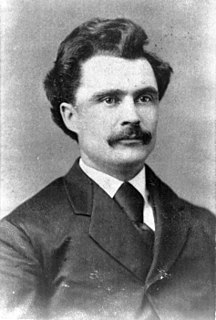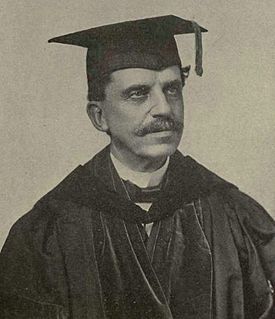A Quote by Ralph Waldo Emerson
Every man is a consumer, and ought to be a producer. He is by constitution expensive, and needs to be rich.
Related Quotes
Consumption is the sole end and purpose of all production; and the interest of the producer ought to be attended to only so far as it may be necessary for promoting that of the consumer. The maxim is so perfectly self-evident that it would be absurd to attempt to prove it. But in the mercantile system the interest of the consumer is almost constantly sacrificed to that of the producer; and it seems to consider production, and not consumption, as the ultimate end and object of all industry and commerce.
[T]he Constitution ought to be the standard of construction for the laws, and that wherever there is an evident opposition, the laws ought to give place to the Constitution. But this doctrine is not deducible from any circumstance peculiar to the plan of convention, but from the general theory of a limited Constitution.
The principle of the Constitution is that of a separation of legislative, Executive and Judiciary functions, except in cases specified. If this principle be not expressed in direct terms, it is clearly the spirit of the Constitution, and it ought to be so commented and acted on by every friend of free government.
Mirth is God's medicine. Everybody ought to bathe in it. Grim care, moroseness, anxiety,--all this rust of life, ought to be scoured off by the oil of mirth. It is better than emery. Every man ought to rub himself with it. A man without mirth is like a wagon without springs, in which one is caused disagreeably to jolt by every pebble over which it runs.
The laws are, and ought to be, relative to the constitution, and not the constitution to the laws. A constitution is the organization of offices in a state, and determines what is to be the governing body, and what is the end of each community. But laws are not to be confounded with the principles of the constitution; they are the rules according to which the magistrates should administer the state, and proceed against offenders.
The producer can put something together, package it, oversee it, give input. I'm the kind of producer that likes to take a back seat and let the director run with it. If he needs me, I'm there for him. As a director, I like to have the producer there with me. As a producer, I don't want to be there because I happen to be a director first and foremost, I don't want to "that guy."
It is for the good of nations, and not for the emolument or aggrandizement of particular individuals, that government ought to be established, and that mankind are at the expense of supporting it. The defects of every government and constitution both as to principle and form, must, on a parity of reasoning, be as open to discussion as the defects of a law, and it is a duty which every man owes to society to point them out.
In Utopia, where every man has a right to everything, they all know that if care is taken to keep the public stores full, no private man can want anything; for among them there is no unequal distribution, so that no man is poor, none in necessity; and though no man has anything, yet they are all rich; for what can make a man so rich as to lead a serene and cheerful life, free from anxieties.







































